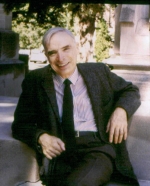
The distinguished scholar of science and religion Ian Barbour died on December 24, 2013, at the age of 90, according to Carleton College (December 27, 2013). Often credited with founding the academic field of science and religion, Barbour was the author of Religion in an Age of Science (HarperCollins 1990), Ethics in an Age of Technology (HarperCollins 1993), When Science Meets Religion (HarperOne 2000), and Nature, Human Nature, and God (Fortress Press 2009) among other books.
In When Science Meets Religion, after reviewing the contentious history of efforts to undermine the teaching of evolution in the United States, Barbour wrote, "I believe that creation science is a threat to both religious and scientific freedom," adding, with respect to Phillip Johnson and Michael Behe, "though these authors are not biblical literalists they err in assuming that evolutionary theory and theism are incompatible. They, too, perpetuate the false dilemma of having to choose between science and religion." Barbour expanded on his disagreement with "intelligent design" in a 2000 talk (published [PDF, subscription required] in Zygon in 2001) critical of his fellow scholar of science and religion Huston Smith's sympathy for the position, writing: "Philosophical proponents of intelligent design, such as William Dembski ... and Stephen Meyer ..., write in the tradition of natural theology, in which science is used as evidence of the existence of a designer. My own approach is not natural theology but a theology of nature, in which one asks how nature understood by science is related to the divine as understood from the religious experience of a historical community." Describing "intelligent design" at least in Behe's and Smith's versions as assuming "intermittent divine intervention," he warned, "The God of the gaps has steadily retreated in the history of modern science." In the same talk, he noted that "[s]cientists have to assume methodological naturalism," that "intelligent design" proponents "do not offer testable hypothesis for scientific research," and that "virtually the entire scientific community agrees on descent with modification from earlier ancestors."
Barbour was born in Beijing, China, on October 5, 1923. He studied physics, receiving his BA from Swarthmore College, his MA from Duke University in 1943, and his PhD from the University of Chicago in 1950. He then earned a BD from Yale Divinity School in 1956. After a few years teaching physics at Kalamazoo College, he went to Carleton College, where he spent the rest of his career in the physics and religion departments, retiring in 1986. Among his honors were his Gifford Lectureship in 1989-1991 and the Templeton Prize for Progress in Religion in 1999.
